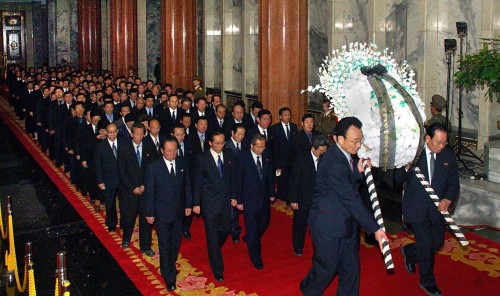Beijing’s influence on N.K. seen to grow with Washington playing a stronger check: analysts
The death of North Korean leader Kim Jong-il is expected to cause traditional alliances to grow stronger, but for now it is uncertain how Pyongyang’s next leadership will unfold, analysts said.
In general, experts said that China’s influence on North Korea will be greater in the post-Kim Jong-il era, while the U.S., South Korea and Japan will close ranks to counter the impact from Beijing.
Sarah McDowall, senior analyst at the IHS Global Insight’s Asia-Pacific region, said countries have little choice but to wait and see how the leadership succession process in North Korea will play out over the coming weeks or months.
The death of North Korean leader Kim Jong-il is expected to cause traditional alliances to grow stronger, but for now it is uncertain how Pyongyang’s next leadership will unfold, analysts said.
In general, experts said that China’s influence on North Korea will be greater in the post-Kim Jong-il era, while the U.S., South Korea and Japan will close ranks to counter the impact from Beijing.
Sarah McDowall, senior analyst at the IHS Global Insight’s Asia-Pacific region, said countries have little choice but to wait and see how the leadership succession process in North Korea will play out over the coming weeks or months.

“The heightened political uncertainty in North Korea will lead to the strengthening of U.S. ties with its two traditional regional allies, South Korea and Japan,” McDowall said in an e-mail.
“At the same time, it will increase China’s strategic resolve to remain as a close ally with North Korea.”
She went on to say that because China will go through a major political change in the 18th National Party Congress next October, it needs a stable regime in the North.
“China’s foremost priority will therefore be to ensure that North Korea’s new leader, whoever that may be, will be able to rally and unify the country together.”
Chinese President Hu Jintao offered his condolences Tuesday on the death of Kim Jong-il, hinting that the country has been preparing to support the North Korea’s power transition to Kim Jong-il’s son Jong-un. Hu had not answered phone calls from President Lee Myung-bak for the second day on Tuesday.
Hahm Chai-bong, president of the Asan Institute for Policy Studies, shared the view that China would want to maintain stability on its border with North Korea by supporting the North Korean regime.
China does not want an influx of millions of North Korean refugees who might ruin its economic growth, he said in a column on the Wall Street Journal.
From the North Korean point of view, China can be “an internal enemy” to North Korea, said Chung Gyu-sup, North Korea expert at Kwandong University. “On the surface, China is a long-time ally of North Korea but in reality, North Korea is scared of China’s influence,” Chung said.
“North Korea will fear the ‘enemy behind’ (China) rather than the ‘enemy in front’ (the U.S.),” he said.
The prospect remains that relations between Washington and Pyongyang are in the dark because of Kim’s death, which came just before the two were about to reach an agreement on U.S. food aid for the famine-stricken state in exchange for North Korea’s suspension of its uranium enrichment program.
The relations among the U.S., South Korea and Japan are expected to become tighter.
Within hours of Kim’s death, President Lee Myung-bak spoke with U.S. President Barack Obama on the phone. Obama and Japanese Prime Minister Yoshihiko Noda had a phone conversation on Tuesday, in which Noda called on the U.S. and South Korea to hold a high-level trilateral meeting.
“Any instability on the Korean Peninsula would pose significant risks for Japan, as it lies within the range of North Korean ballistic missiles,” McDowall said.
By Kim Yoon-mi (yoonmi@heraldcorp.com)
-
Articles by Korea Herald


![[Exclusive] Korean military set to ban iPhones over 'security' concerns](http://res.heraldm.com/phpwas/restmb_idxmake.php?idx=644&simg=/content/image/2024/04/23/20240423050599_0.jpg&u=20240423183955)

![[Graphic News] 77% of young Koreans still financially dependent](http://res.heraldm.com/phpwas/restmb_idxmake.php?idx=644&simg=/content/image/2024/04/22/20240422050762_0.gif&u=)



![[Pressure points] Leggings in public: Fashion statement or social faux pas?](http://res.heraldm.com/phpwas/restmb_idxmake.php?idx=644&simg=/content/image/2024/04/23/20240423050669_0.jpg&u=)










